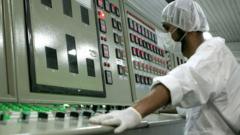In an unprecedented move, the United States and Iran are set to engage in high-stakes nuclear talks this Saturday, as announced by President Donald Trump. Following a meeting with Prime Minister Benjamin Netanyahu of Israel, Trump revealed that the discussions would occur in Oman, albeit Iran's Foreign Minister Abbas Araghchi termed them as “indirect.” Trump emphasized the necessity of these talks, stating that failure could place Iran in a precarious situation.
US and Iran Prepare for Pivotal Nuclear Negotiations

US and Iran Prepare for Pivotal Nuclear Negotiations
The anticipated discussions signal a potential turning point in long-standing tensions between the two nations.
The talks come in the wake of escalating sanctions imposed by the U.S. over Iran's nuclear advancements, which Iran argues are solely for peaceful purposes. Despite this, the nation has progressively disregarded the limitations of the original 2015 nuclear agreement, asserting it can now produce enough enriched uranium for several nuclear bombs.
Trump noted the challenging dynamics, underscoring the importance of a successful negotiation to avoid potential military actions. "We all agree that striking a deal is far preferable to confrontation," he remarked. Araghchi echoed sentiments of cautious optimism, calling the upcoming talks an "opportunity" while emphasizing that the "ball is in America's court."
Israeli PM Netanyahu reiterated his country's urgent position against a nuclear Iran, advocating for a diplomatic process akin to Libya's disarmament in the early 2000s. However, Iran remains firm that dismantling its nuclear capabilities, a demand from U.S. officials, is non-negotiable, and it seeks to ensure its security amid regional tensions.
The backdrop of this diplomatic engagement is marked by a long history of animosity, particularly after the U.S. abandonment of the nuclear deal that had previously paved the way for significant sanctions relief in exchange for nuclear curbs. As both sides gear up for what could be a transformative series of discussions, the world watches closely, aware that the outcomes may significantly alter global geopolitics.
Trump noted the challenging dynamics, underscoring the importance of a successful negotiation to avoid potential military actions. "We all agree that striking a deal is far preferable to confrontation," he remarked. Araghchi echoed sentiments of cautious optimism, calling the upcoming talks an "opportunity" while emphasizing that the "ball is in America's court."
Israeli PM Netanyahu reiterated his country's urgent position against a nuclear Iran, advocating for a diplomatic process akin to Libya's disarmament in the early 2000s. However, Iran remains firm that dismantling its nuclear capabilities, a demand from U.S. officials, is non-negotiable, and it seeks to ensure its security amid regional tensions.
The backdrop of this diplomatic engagement is marked by a long history of animosity, particularly after the U.S. abandonment of the nuclear deal that had previously paved the way for significant sanctions relief in exchange for nuclear curbs. As both sides gear up for what could be a transformative series of discussions, the world watches closely, aware that the outcomes may significantly alter global geopolitics.






















